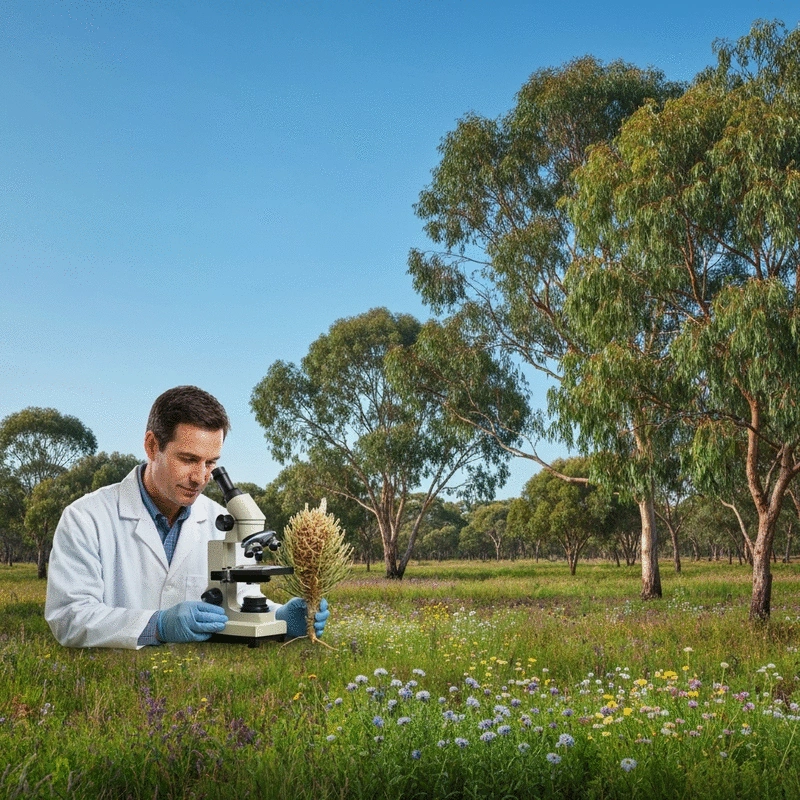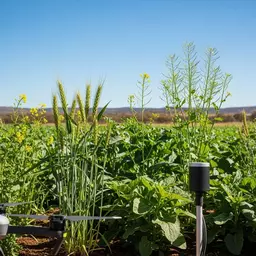Climate Resilience Focus
- ✓Developing drought-resistant crops
- ✓Enhanced pest management strategies
- ✓Collaborative climate adaptation research
As we stand on the brink of significant advancements in plant science, it's essential to recognize how these innovations can reshape our agricultural landscape. With climate change presenting unprecedented challenges, the insights gathered from recent research are not only promising—they are crucial for fostering a sustainable future.
Australia's plant science landscape is rapidly evolving, driven by the need for climate resilience and agricultural sustainability. The visual below highlights the primary focus areas and the key institutions driving these innovations.
The landscape of plant science in Australia is evolving rapidly, and staying abreast of the latest breakthroughs is crucial for our agricultural future. With the challenges posed by climate change, innovative research is paving the way for resilient farming practices that can sustain our ecosystems. At Plant Frontier Insights, we believe that understanding these developments is not just an academic exercise but a necessity for all stakeholders involved in agriculture.
As we approach 2025, the focus on plant science will be integral in shaping sustainable agricultural practices. The innovations we witness are not only exciting but critical for ensuring food security while maintaining ecological balance. So, how do these breakthroughs play a role in our future? Let’s explore.
Plant science innovations are vital for several reasons. They contribute to enhancing food security, improving crop yields, and ensuring environmental sustainability. With a growing population and changing climate patterns, the demand for efficient agricultural practices is at an all-time high. By investing in research and development, we can foster an agricultural landscape that is both productive and sustainable.
Each of these points underscores the importance of continuous research in plant science, which is central to maintaining Australia's agricultural resilience. As we delve deeper, we can see how key areas of focus are emerging in this field. For more detailed insights into agricultural resilience, refer to the Department of Agriculture, Fisheries and Forestry's annual report.
Two of the primary focuses in plant science today are climate resilience and agricultural sustainability. These areas are interlinked and address both the immediate needs of agricultural productivity and the longer-term implications for our environment. Research in these fields encourages practices that help farmers adapt to changing climates while ensuring that our natural resources are conserved for future generations.
By concentrating on these key areas, we can create a more sustainable agricultural framework that supports both farmers and the ecosystem. It’s exciting to envision how these strategies will reshape our agricultural landscape in the coming years!
Research institutions like CSIRO and various Australian universities are at the forefront of these innovations. Their contributions are essential for advancing plant science. For instance, they conduct groundbreaking research that leads to significant advancements in pest management, crop genetics, and sustainable practices. It's inspiring to see how collaboration among these entities fosters an environment of innovation! The Plant Health Australia annual report highlights key efforts in pest management and biosecurity.
As we look to the future, the partnership between research institutions and industry will play a pivotal role in overcoming current and future challenges in agriculture. Together, we can harness this knowledge and drive pivotal changes for a resilient and thriving agricultural sector in Australia.
Did you know? Integrating indigenous knowledge into modern agricultural practices can enhance resilience against climate change. Collaborating with Indigenous communities not only preserves traditional wisdom but also fosters innovative solutions that honor the land and its ecosystems.
As we gaze into the future of plant science in Australia, it's clear that ongoing research and developments are set to redefine our agricultural landscape. Innovative practices will emerge, focusing on sustainability and resilience, crucial for adapting to the changing climate. We can expect a surge in projects that not only advance plant health but also forge connections between scientists, farmers, and the wider community.
These initiatives are vital as they promise to empower farmers with tools that can enhance productivity while protecting our ecosystems. As someone passionate about bridging the gap between research and practical application, I believe these developments will significantly impact Australia’s agricultural future. For more on the importance of collaborative efforts in plant conservation, refer to the Australian Native Plant Conservation Society's President's Report.
The realm of plant science is rapidly evolving, and the next few years will be pivotal. We can anticipate:
These advancements will not only improve crop yields but also contribute to a healthier environment. It’s an exciting time for researchers and practitioners alike, as we work together to ensure a sustainable agricultural landscape.
Indigenous knowledge offers profound insights into sustainable practices that have been honed over thousands of years. This wisdom can greatly complement modern scientific techniques, ensuring that our approaches are both innovative and respectful of the land. By integrating this knowledge into our research, we can develop solutions that honor traditional practices while addressing contemporary challenges.
As I interact with various stakeholders in plant science, the value of this knowledge becomes increasingly evident. It emphasizes that our journey toward sustainability must be inclusive and collaborative.
The Future Food Systems Cooperative Research Centre (CRC) is at the forefront of addressing key challenges in food production and sustainability. By focusing on innovation, this CRC aims to create a resilient food system that meets the demands of a growing population. Their initiatives are game-changing, with major areas of impact including:
As we engage with these initiatives at Plant Frontier Insights, it’s clear that supporting such research is vital for our agricultural future. I encourage everyone in the community to stay involved, as these efforts will pave the way for sustainable practices that benefit both farmers and consumers alike.
Here is a quick recap of the important points discussed in the article:

 As the agricultural landscape in Australia evolves, the role of genetic innovation tools becomes inc
As the agricultural landscape in Australia evolves, the role of genetic innovation tools becomes inc
 As the agricultural landscape in Australia faces mounting challenges, understanding effective crop p
As the agricultural landscape in Australia faces mounting challenges, understanding effective crop p
 As Australia faces growing agricultural challenges, the significance of biosecurity cannot be overst
As Australia faces growing agricultural challenges, the significance of biosecurity cannot be overst
 As we delve into the intricate world of biosecurity, consider this: the health of Australia’s ecos
As we delve into the intricate world of biosecurity, consider this: the health of Australia’s ecos